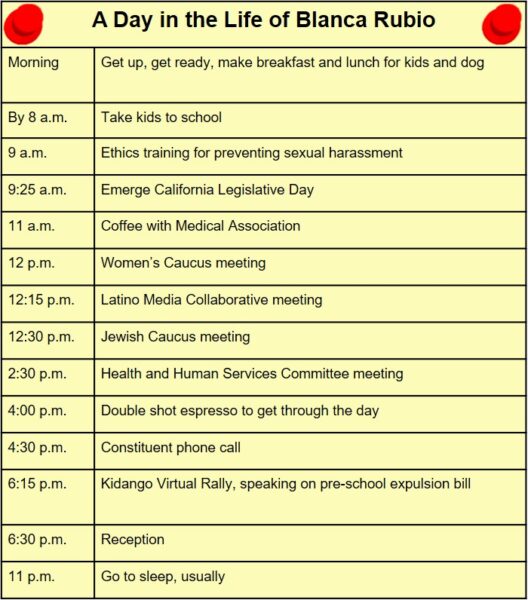Gazing at the California State Capitol lit up in the night, a teary-eyed father said in Spanish, “I never thought I would be in Sacramento, and I thought even less that I would be in Sacramento for these reasons.”
His daughters were being sworn in at the capitol.
His oldest, Blanca Rubio, was starting her second term as an assemblywoman and his younger daughter, Susan Rubio, her first term as a state senator.
Now, Assemblywoman Blanca Rubio is in her fifth year representing the constituents of the 48th Assembly District, home to Citrus College and many of its students.
Citrus Trustee Mary Ann Lutz said that when she first met Assemblywoman Rubio, “it was immediately clear to me that she has a public servant’s heart.”
“Throughout her career, whether she was a local school board member or assembly member, she always represents her constituents with their best interest at heart,” Lutz said.
As a Latina, Mexican immigrant who has been deported, community college student and mother of two, Rubio said she hopes to make a difference and make her children proud.
“If I can inspire them to change whatever they think their reality is, to know that if I could do it — coming from the place that I came from — that if I could do it, anybody could do it,” she said.
Rubio’s children, 13 and 14, have been engaged in her work since she first ran for office.
“In their mind, they understood that my position had the ability to fix what’s going on,” Rubio said. “So I was like, ‘Man, that’s a lot of pressure,’ because now they’re looking at me like, ‘OK, mom, what are you going to do?’”
Rubio has authored legislation to help survivors of domestic violence, protect preschoolers from expulsion, assist foster youth, remove red tape on student housing and create equity in the distribution of college grants.
Her most recent effort was a three-year pilot program with the Angel Food Project to provide medically tailored meals to patients with congestive heart disease. The pilot reduced the patient rehospitalization rate from 1 in 3 to 1 in 20 and is now part of Gov. Gavin Newsom’s budget. She said she now hopes to expand the program to patients with diabetes.
“Those are the types of cool things that I believe are going to help,” Rubio said. “It might not be riveting and ‘hashtagable,’ but it makes a big difference in that child’s life, in that domestic violence survivor’s life, and, you know, in this case … I’m going to be able to help them by providing medically tailored food.”
Accomplishing all of this takes a lot of time. Sitting on multiple committees and subcommittees, her day is filled with meetings and her desk is filled with black folders full of talking points, bills and briefings. Rubio spends Sunday through Thursday at her state office. She introduces bills, attends events to promote them, rallies her colleagues for votes, and waits in hope that her bills get passed.
On Fridays and Saturdays, Rubio travels to her district to attend events and speak to constituents about the work she is doing.
Since both offices have distinct roles, Rubio has multiple staff members at each office.
Taylor Woolfork, her legislative director, has 10 years of experience in the state legislature. He said, “There is no better person to be around than Assemblywoman Rubio.”
“Day in and day out, she brings a passion, tenacity and dedication to public service that serves as an example to all staff,” Woolfork said in an email interview. “Her energy brightens up a room.”
Rubio said she relies on her scheduler, Hilda Escobar, for her and her children’s commitments.
“They call her Mama Hilda,” Rubio said. “There is no way I could do it on my own.”
Given how time-consuming the job can be, Rubio advises newer members, especially women, to take care of their health, take time for themselves and reconnect with their families since they spend so much time apart.
“We’re going and going and going, that we forget that we’re normal people,” Rubio said.
Rubio and the other members of the women’s caucus make it a priority to support each other. Last month, they took turns babysitting a colleague’s 10-month-old when she had to go to committee and was without a babysitter.
“Women, we want to be responsible and demonstrate that we do the same amount of work, but the problem is we do more than the same amount of work,” Rubio said.
Given that women are still underrepresented in the legislature — only 175 women have been elected so far, compared with 4,500 men — the assemblywomen fight against time and sexism.
“We make the same amount of money and have the same votes, so don’t discount my opinion,” Rubio said. “Sometimes it feels like we have to fight harder to get a seat at the table, even though we are at the table.”
Yet, even on the toughest days, Rubio said she is still smiling and willing to talk and work.
Her favorite part is walking into the historic state capitol building and “knowing that someone like me … I’m able to have a place in this building.”



